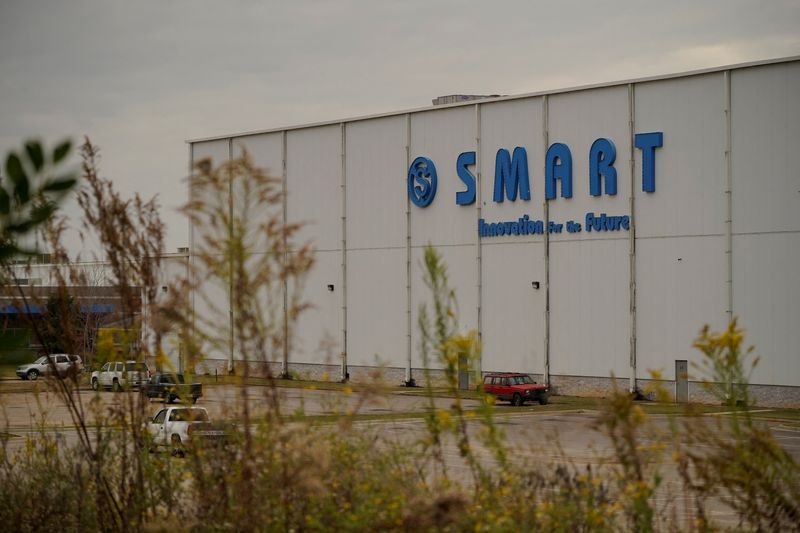By Joshua Schneyer, Mica Rosenberg and Kristina Cooke
NEW YORK (Reuters) -Hyundai Motor Co said it is in talks with the U.S. Department of Labor to resolve concerns about child workers in its U.S. supply chain, and the company is taking corrective actions after a Reuters investigation found children as young as 12 working in hazard-laden Alabama factories linked to the automotive giant.
In a statement late Tuesday, Hyundai told Reuters it has held a series of discussions with the Labor Department, which has been investigating a Hyundai subsidiary in Alabama and other parts suppliers to the automaker, and its sister brand Kia Corp, for potential child labor violations.
The talks with the U.S. labor regulator have focused on "compliance measures across our supply chain," company spokesman Michael Stewart said in a statement. He also detailed several new measures Hyundai is implementing to "ensure non-compliance never happens again."
Among them: Hyundai said it will roll out new employment training programs throughout its U.S. supply chain, validate identification documents for job applicants, set up anonymous tip hotlines, and discourage the use of third-party staffing agencies. Reuters found those agencies sometimes placed underage workers in the suppliers' plants.
The Labor Department declined to comment on meetings or discussions with Hyundai. In a statement, a department spokesperson said it is "committed to ensuring employers understand their responsibility under the law and engages with employers to help them achieve compliance."
Hyundai's statement comes as a U.S. congresswoman whose Alabama district includes the site of the company's U.S. assembly plant is pressing the automaker to ensure kids are no longer illegally working in the state's automotive plants.
Congresswoman Terri Sewell, a Democrat, said she has held a series of discussions with Hyundai, including one last week, to address the concerns at auto parts factories that supply Hyundai and Kia.
"I have made clear that the use of child labor is abhorrent and unacceptable, and that there must be accountability," Sewell told Reuters in a statement. The congresswoman said she will continue working with Hyundai, federal regulators and autoworkers in Alabama to ensure that the automaker's actions "will be sufficient to prevent this from happening again."
'CHILD LABOR IS UNACCEPTABLE'
Hyundai is Alabama's top factory employer. It relies on a network of mostly Korean-owned suppliers across the state to make its popular U.S.-made cars and SUVs at its Montgomery plant.
"We share Congresswoman Sewell's view that the use of child labor is unacceptable," Hyundai said.
Sewell's comments are the first from a high-ranking Alabama official on child labor problems in Hyundai's supply chain. Alabama Governor Kay Ivey's office, as well as other U.S. lawmakers from the state, didn't respond to requests for comment.
The new actions by Hyundai and its discussions with regulators and lawmakers come after Reuters documented child labor in various Alabama auto plants making parts for Hyundai or Kia. The reports have prompted investigations and blowback from investors, unions and consumers.
One of the plants, SMART Alabama LLC, is directly owned by Hyundai. The U.S. and Alabama Labor Departments launched an investigation after a Reuters article last July found Central American migrant kids had been working at SMART.
Then, in August, authorities raided SL Alabama LLC, another Hyundai supplier, and removed several children from the factory floor. Regulators fined SL and its labor recruiter.
In December, Reuters reported first-hand accounts of recent child labor in more Korean-owned automotive factories across the state, and revealed that state and federal authorities were investigating as many as ten Alabama plants that supply Hyundai and Kia.
Those probes are ongoing. Authorities are also investigating whether underage workers in Hyundai's Alabama supply chain may have fallen prey to child labor trafficking networks, according to two officials familiar with the matter.
Hyundai said it took "immediate action" upon learning of violations at SMART Alabama and SL last year.
EXPANDING U.S. OPERATIONS
Hyundai has visited or held talks with 29 supply plants across Alabama, and has required them to submit to independent third-party audits, the company said this week.
"As a result, Hyundai is confident there are no current underage labor issues at our Tier 1 suppliers," it added. Tier 1 suppliers manufacture Hyundai vehicle parts to sell directly to the automaker.
Once authorities began investigating, Reuters reported earlier, staffing firms dismissed young-looking foreign workers from several of the plants where they had placed them.
The child labor reports have put a spotlight on Hyundai's growing operations in the United States. Last year, it broke ground on a $5.54 billion electric vehicle and battery plant in Georgia.
Hyundai and Kia both have global worker charters that prohibit child labor in their factories and those of suppliers. Alabama and U.S. law restrict factory work for people under age 16, and all workers under 18 are forbidden from many jobs in auto plants, where metal presses, cutting machines and speeding forklifts can pose dangers.

Amid labor shortages in the region, many of the Alabama plants relied on staffing firms to recruit low-wage assembly line workers with little vetting, Reuters found.
Any tardiness to deliver their quota of parts to Hyundai and Kia could result in the plants accruing late charges of thousands of dollars per minute. Regulatory fines for child labor, by contrast, can be relatively small.